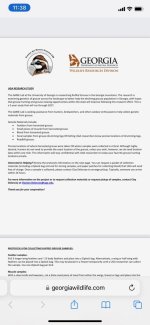Killer Kyle
Senior Member
I'm not sure if it is common knowledge out there or not, but DNR and UGA are partnering together to conduct a five year study of ruffed grouse genetics in north Georgia. They really need samples of various types from harvested birds. I believe they are looking for blood, feather, and muscle tissue samples.
Please, please, PLEASE collect samples and get them to DNR or to UGA. DNR and UGA are issuing DNA sample collection kits, and they can get them to you.
As you all know, Georgia grouse need all the help they can get. Please take part in this valuable research and let's work together to help this population of game bird. Participation in studies such as this drive conservation efforts, and we need participation from every Georgia grouse hunter out there.
You can contact Emily Rushton (DNR grouse biologist) at:
emily.rushton@dnr.ga.gov
706-557-3264
You can also contact Clay Delancey from the UGA Game Lab at:
Clayton.Delancey@uga.edu
If you live anywhere in Region 2, you can also contact me here and I can get the kits to you.
Please see the attachments here for additional information. I will try to find a direct link to this information and post it here in this thread soon. Thank you for the help and cooperation. Please have a safe and blessed new year and remainder of the season. Good luck fellas!
Please, please, PLEASE collect samples and get them to DNR or to UGA. DNR and UGA are issuing DNA sample collection kits, and they can get them to you.
As you all know, Georgia grouse need all the help they can get. Please take part in this valuable research and let's work together to help this population of game bird. Participation in studies such as this drive conservation efforts, and we need participation from every Georgia grouse hunter out there.
You can contact Emily Rushton (DNR grouse biologist) at:
emily.rushton@dnr.ga.gov
706-557-3264
You can also contact Clay Delancey from the UGA Game Lab at:
Clayton.Delancey@uga.edu
If you live anywhere in Region 2, you can also contact me here and I can get the kits to you.
Please see the attachments here for additional information. I will try to find a direct link to this information and post it here in this thread soon. Thank you for the help and cooperation. Please have a safe and blessed new year and remainder of the season. Good luck fellas!



